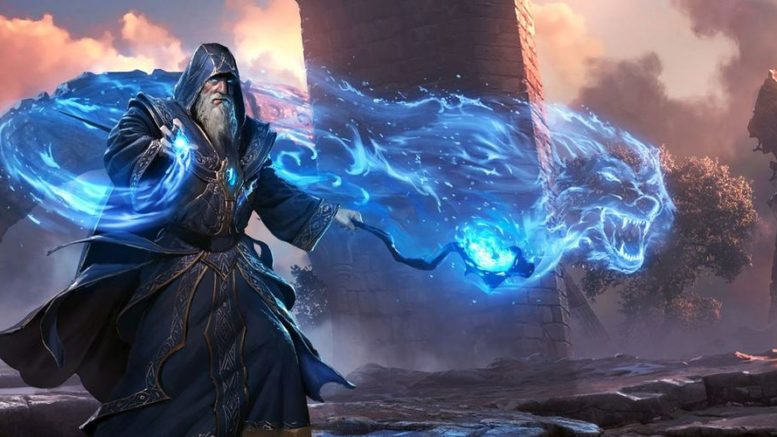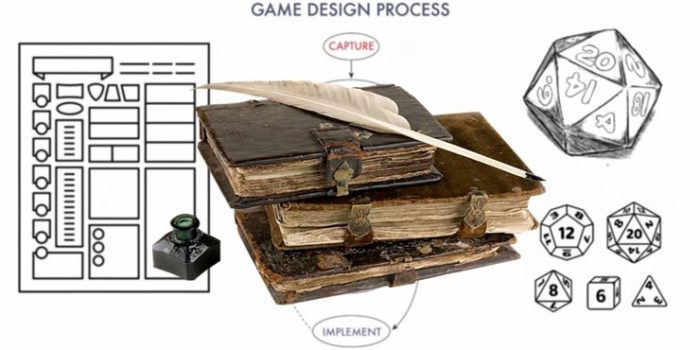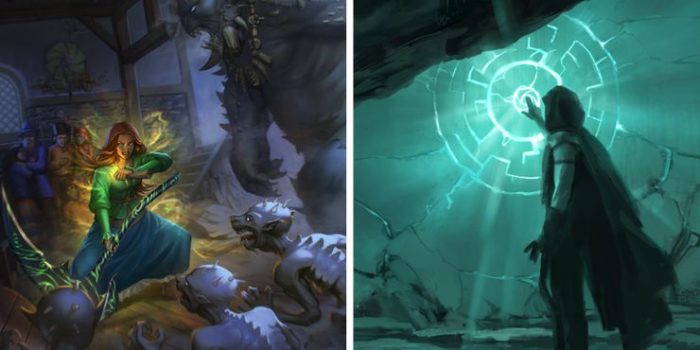Game Masters of tabletop RPGs can help player design rules for new superpowers in Dungeons & Dragons and other roleplaying game systems.
Fantastical tabletop roleplaying games, be they classic dungeon-crawling systems like Dungeons & Dragons or spectacular superhero RPGs like Mutants & Masterminds, often have rules and game mechanics to represent people with superhuman abilities such as magic or mutations. These “superpower rules” are generally the end-product of countless hours of play-testing, carefully calibrated to be fun for players to use, but not so overpowered as to invalidate other superhuman abilities in the RPG. That said, it is possible for DMs and/or players to create their own home-brew superpower rules for their own original RPG campaign; they just need to understand what makes certain superpowers interesting and how to make them fit within the core principles of the game system they’re using.
Not long after the publication and runaway success of early Dungeons & Dragons, tabletop game designers jumped on the bandwagon with their own RPG products – dungeon-crawling games with simpler or more intricate rules than D&D, along with RPGs built around genres besides sword and sorcery. The first superhero-genre roleplaying games, Superhero: 2044 and Villains & Vigilantes, were released in the late 1970s and were full of interesting, unique rules for creating superhero characters and simulating the stories of crime-fighting so iconic to western comic books. The rules for superpowers in these systems, however, were very minimal and vague, since the designers of this game wanted GMs and players to design their own custom powers.
More modern superhero-themed tabletop RPGs like Mutants & Masterminds and the mythic fantasy game Exalted simulate the diverse abilities of superheroes and demigods by giving players rules for very abstract abilities – swift movement, supernal strength, invisibility, hurling non-physical projectiles – then getting players to add narrative flavor and unifying themes to the power sets of their characters. In these sorts of systems, a martial arts RPG PC who empowers their movements with “Qi” life energy might have the same set of powers as a PC with insect body parts. Both these class-less “point-buy” RPG systems and D&D-style class RPG systems can be “hacked” by Game Masters or players who want to introduce new kinds of superpowers into the game – particularly if they keep the following tips and tricks in mind.
To Design New Superpowers, Research RPG Design Principles Like D&D’s Bounded Accuracy
When designing superpower rules for tabletop RPGs – what these powers can do, what dice players should roll when using them, how frequently these powers can be used – GMs and players should always seek to understand the core design principles of the roleplaying system they’re using in order to ensure the powers they design are balanced. In the rules of Dungeons & Dragons 5e, for instance, there is an unspoken design concept called “Bounded Accuracy” where a player rolling a D20 for skill checks, attack rolls, or saving throws should not get a result higher than 31, even with attribute bonuses, spell buffs, enchanted items, and so on.
This hard limit on the possible results of dice rolls in D&D 5e lets Dungeon Masters continue to challenge high-level players with mundane obstacles. This can include locked doors or swarms of weak but numerous monsters – all while making it possible for players to build effective characters without relying on magical weapons and armor. Consequentially, anyone who attempts to design a new character class, new spell, or new superpower for D&D 5e must adhere to this Bounded Accuracy principle if they don’t want to break the game.
When Designing New D&D Power Rules, Include Ways For Superpowers To Evolve
Most tabletop RPGs are intrinsically about growth and ingenuity. As a classic RPG campaign continues, player characters “level up,” unlocking new abilities while also improving the effectiveness of old abilities. By the same token, tabletop RPGs centered around gods, mythic heroes, or other superhuman beings should offer players ways to improve or expand on the scope of their PC’s superpowers (in contrast to western comic books where superheroes gain and retain a fixed set of superpowers or gadgets).
In a D&D-style RPG system with character classes, players frequently unlock new abilities and magic spells within their class’s purview while the dice bonuses for old abilities increase. Other superhuman RPG systems, home-brew or otherwise, may have more freeform rules for representing just how precisely or creatively PCs can use their superpowers. For instance, the system-agnostic superhero tabletop roleplaying game system Empower introduces six special “Edge” Attributes called Control, Destruction, Movement, Protection, Spectacle, and Utility, which represent how talented a PC is at using their power in delicate, precise, or brutal ways.
This spectrum of abilities in Empower are mechanically similar to the magic rules in Mage: the Ascension, a gothic punk RPG about modern reality-warping spell-casters. In the aforementioned system, players improve their PC’s magic by adding “dots” to the scores of magical affinities such as Force, Time, Matter, Spirit, or Entropy. The higher these scores, the more dice a player can roll when their character tries to cast new magic in these particular categories.
Study Power Creation Rules From Superpower RPGs When Hacking RPGs Like D&D
Chris Birch, the founder of the Modiphius Entertainment game company, once stated tabletop game designers should “read a lot of role-playing game books so [they] don’t go around claiming [they’ve] created the “ultimate game” that no one’s ever thought of, because it’s probably been done before.” In this spirit, when a DM designs a brand-new tabletop roleplaying game where players can design their own custom superheroes with custom superpowers, they should study the rules and design principles of other superhero-focused roleplaying games.
Even if a Game Master is hacking an existing RPG system like Dungeons & Dragons, it’s still a good idea to study the rules and approaches of roleplaying games where players get to build their own superpowers. Mutants & Masterminds and Trinity Continuum: Aberrant are good examples of the “build your own superhero” RPG, as is the Indiegogo-funded sourcebook Exigents: Out of the Ashes, an upcoming supplement for Exalted: 3rd Edition that will let players design fantasy heroes who gain thematic powers from gods both large and small. By understanding the internal logic of the superpower design rules in these games, GMs can adapt their design principles to the RPG they’re trying to modify.
Article plucked from:
https://screenrant.com/dungeons-dragons-superhero-builds-powers-dm-help-dnd/




Be the first to comment on "How DMs Can Help Players Build Their Own Powers In D&D & Superhero RPGs"